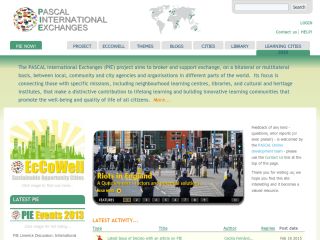I am hopeful that Outside the Box, widely applauded as a concept but not actively used beyond a rising readership, will develop the active and original thinking desperately needed if learning perspectives are to be brought to be bear on the serious and urgent needs pressing our societies and social structures.
The PASCAL Catania Conference in October 2015 will be an important test. Please read the recently posting of PASCAL’s senior learning cities member-advocate, Normal Longworth which includes:
I think that [PASCAL] has 2 options - it retreats within its own silos of university involvement with society, social capital, place-making, learning regions and observatory practice, or it expands its remit to cover other issues that affect the planet - sustainability and all its environmental branches, global economic reform, fundamentalism, corporate responsibility, poverty, global resource management, educational reform, xenophobic nationalism etc etc.- perhaps with partner organisations.
PASCAL was conceived as a partnership of regions with universities. The essential regional partners have become less central. To retain our uniquely distinctive identity and purpose we need to rebalance and return Place to the heart of what we do and to understand why universities may tend to connect less rather than more with what really matters.






